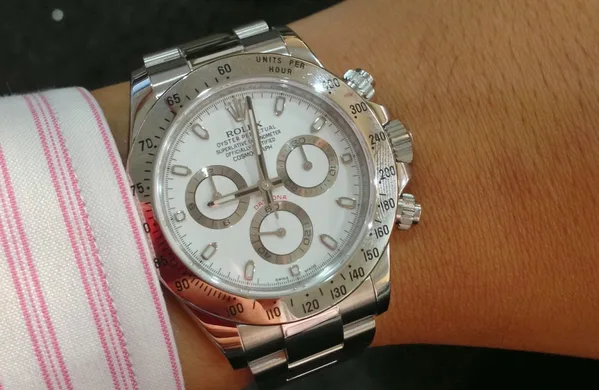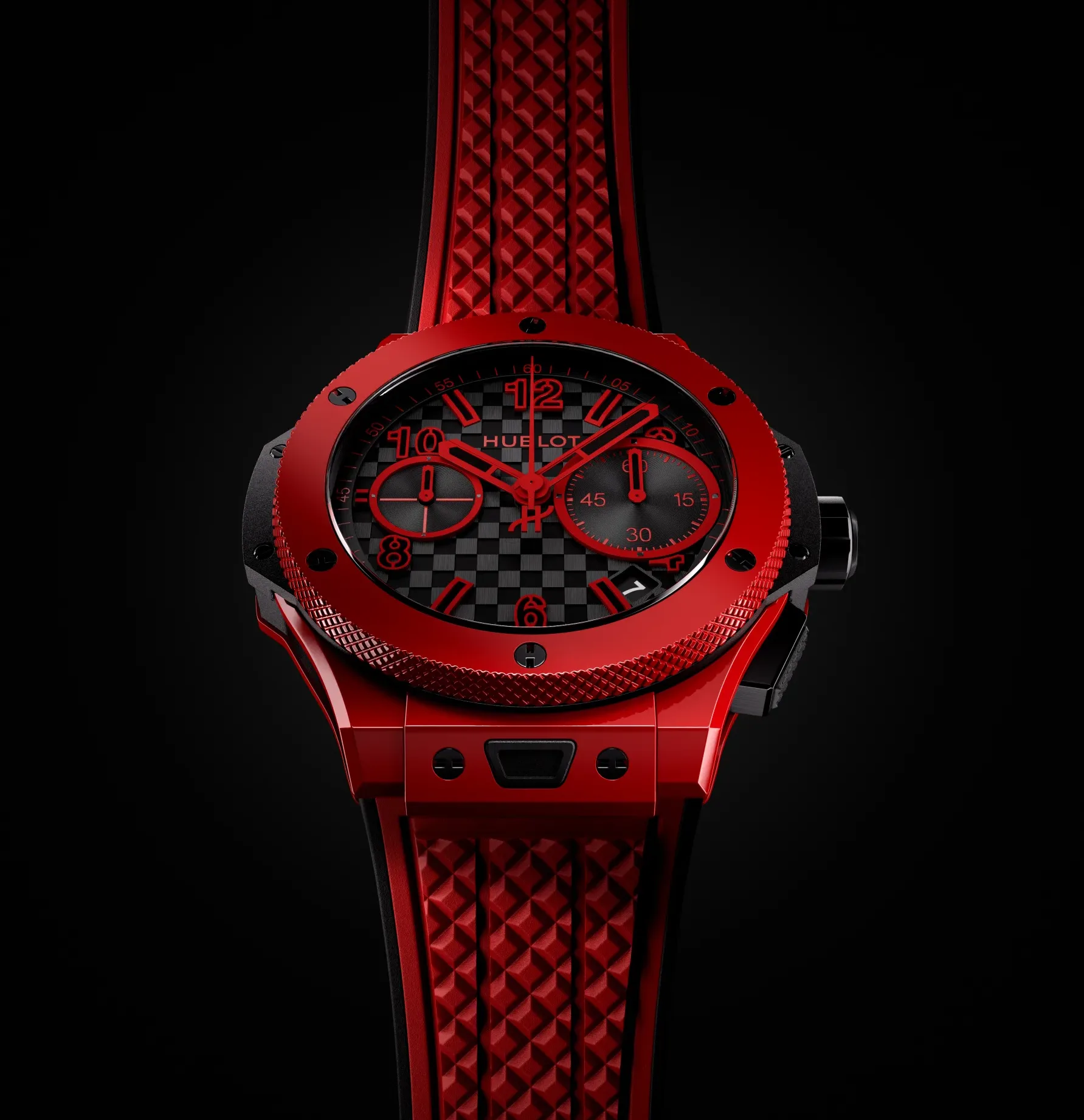By Meor Amri Meor Ayob
People do say, once you own a Rolex watch, you become life-long fan of the brand and its mystique.
After getting my first Rolex back in 2010, I started to explore the history behind the brand and the various models available. My preference for Rolex has always been the sports model. To be more specific, sports model without the cyclops eye. Honestly, the cyclops eye is ugly in my view. Rolex should keep the crystal on their watches flat.
Four years since my first Rolex, I have added my fourth, the Daytona into the collection.
This is considered a major purchase on my part. Therefore, I only trust a known AD in Kuala Lumpur to handle the transaction. After the standard “VIP” treatment at the AD’s stately establishment, I faced a dilemma: Should I get the white or black faced Daytona? After looking at both and comparing them on my wrist, I decided to go for the white faced version.
The display box with its customary green and wavy top.

Opening the box reveal the lovely Daytona that I just purchased.
Like the other watches in Rolex’s Oyster Professional series, the Cosmograph Daytona was created to be a robust watch designed to measure and calculate elapsed time and average speed via the chronograph registers on the dial and the graduated tachymeter bezel. The Daytona has been designed to endure the rigors of motor sports and the Oyster case, Triplock crown and the screw-down chronograph pushers combine provide the Daytona the ability to resist 100 meters of water pressure. The Cosmograph became such an icon in the sport of auto racing, that during the late 1960s, the watch earned the nickname “Daytona” after the Daytona International Speedway. Although the advent of technology has give new tools that are cheaper, lighter and more accurate than what the Daytona could ever measure, the nostalgia of a mechanical measuring devise still captures the interest of many.
One cannot help but admire the beauty of the Daytona. Beneath the sapphire crystal lies a white dial with white gold hands and markers, which provide excellent legibility. The markers and hands are also painted with Superluminova to provide low-light visibility. The polished bezel, case and center links of the bracelet also add to the quality of the Daytona.

The Daytona is powered by the Rolex Caliber 4130 which made its debut in 2000. Like most high-end chronograph movements, the caliber 4130 uses a column wheel design to engage and control the chronograph functions. Rolex uses an innovative vertical friction coupling for engaging the column wheel functions. This particular design feature is evident when the chronograph seconds hand is engaged. The chronograph second hand exhibits a smooth start and is free of the staggered movement so typical of other mechanical chronographs.
The whole movement of the 4130 has 201 components. The caliber uses ball bearings made of ceramic in the automatic winding system. The use of ceramic ball bearings means better rotor spin efficiency and lower maintenance. Meanwhile, the free-sprung balance wheel is finely regulated via Microstella screws and employs Rolex’s PARAFLEX shock absorption system. Attached to the balance is the Rolex “Parachrom Bleu” hairspring, with its unique anti-magnetic and temperature resistant properties. All in all, the 44 jewel movement oscillates at 28,800 bph and has power reserve of 72 hours.
The caliber 4130 is self-winding via a bidirectional rotor but can also be manually wound. Of course, no Caliber 4130 finds its way into a Daytona case without first attaining COSC certification.

Above is the guarantee as well as the attestation of the COSC certification for the watch. Note the lack of any reference to “Daytona”. Instead, the formal model name for the watch is just “Oyster Perpetual”. This is a real surprised as Rolex has more-or-less adopted the nickname when it etched the rotor of the watch with the word “Daytona” as well as the same on the dial itself. Below is a photo of the Caliber 4130 taken from the internet that clearly shows Rolex recognizing the nickname given to the watch by branding it as such.

The Daytona is 40 mm across. Measuring from the bezel, it is 38.5 mm across with a 30.5 mm diameter for the sapphire crystal. Thickness is approximately 12.2 mm. The lug width is 20 mm and the bracelet tapers down to 17.2 mm at the clasp.
The bracelet and clasp of the Daytona are of solid construction. The bracelet, clasp as well as the main watch casing are made of polished 904L steel. A super-alloy, the 904L is extremely resistant and highly polish-able.

The bezel is made out of the same material as the watch casing i.e. 904L carbon steel. The tachymeter is etched on it and painted black to make the necessary contrast for ease of reference. Its scale provides a measuring speed of up to 400 units per hour, whether expressed in kilometres or miles. The centre has the hour, minute and seconds-chrono hands. The seconds hand is in a sub-dial set at the 6 o’clock position. A 30-minute counter is at 3 o’clock and 12-hour counter is at 9 o’clock. The seconds-chrono hand is accurate to within 1/8 of a second.

The markers as well as the hours and minute hands are painted with Superluminova to provide the necessary brightness in low lighting situations.
Just outside the boundary of the markers are micro-markers painted on the dial itself. There are 25 micro-markers in-between two main markers which makes up 300 overall. This gives a measurement accuracy of 0.2 seconds.
Rolex loves to put a lot of information on its dial. Apart from the customary “ROLEX” and “SWISS MADE”, there is also the official model of the watch “OYSTER PERPETUAL” and the term “SUPERLATIVE CHRONOMETER OFFICIALLY CERTIFIED COSMOGRAPH”. Interestingly, the nickname “DAYTONA” is written in red. I have yet to find the explanation on why it is different. If anyone knows, please add a comment at the bottom of this article.

The side profile of the watch shows the smooth design of the watch casing. This is good as it minimizes the possibility of snagging on shirt cuffs.

Note the seamless shine on every part of the watch. The use of a common base metal and subjecting each part to the same treatment create the consistency.

Rolex has added a micro adjustment mechanism to the clasp system. This enables users to adjust the tightness of the bracelet without the need of a tool. Approximately 1 cm of play is available.

The size is just nice for my 7.5 inch wrist. There is no weight to the watch and your wrist feels natural very fast. Although the chronograph function and the tachymeter scale is one of Daytona’s claims to fame, unfortunately, it is too fine for my aged eyesight.
I am not blaming the watch at all. It just goes to show that valuable things can only be afforded by old men after a life time of working (well, in this day and age, you do find many millionaires at a very young age). The pocket is willing, but the body is not!!!
This watch is designed as a tool watch but capable of being a dress watch in a split second. Above are a few photos that show you the curves designed into the watch case to minimize snagging.
Overall, I am impressed. There wasn’t any instances when the watch function anything less than what has been advertised. Despite the inability to fully utilize the various timing functions available on the watch due to my failing eyesight, everything else fits perfectly with any conceivable scenario imaginable.
The Daytona really fits in the bill as a “Grail” watch. The best thing is that I have one!!!

Meor Amri Meor Ayob – Contributing Editor
Meor Amri is a passionate watch collector from Malaysia, Kuala Lumpur. Having bitten by the horology bug in 2010, he has written extensively about the watch scene and has assembled a large collection of watches (excessively!!) on his own free time.
His blogs on the same subject are: Watch Collection Hobby & My Horological Photos






